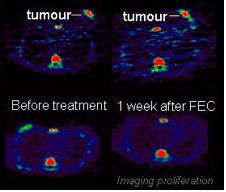
Eric Aboagye
Group Members
Cancer affects all segments of society. Our group is interested in developing new molecular and functional imaging methodologies, principally based on Positron Emission Tomography (PET), to understand disease biology and for assessing early response to novel cancer therapies.
The group focuses on i) development of new radiotracers, ii) qualification of radiotracers as biological markers of cancer targets and pathways in living subjects, and iii) clinical investigation of novel PET methodologies (probes and analytical approaches) to assess disease phenotype and early response to novel cancer therapies. We are currently developing strategies to image, in real time, biological process such as cell proliferation, choline metabolism/mitogenic signal transduction, apoptosis, angiogenesis and gene expression.
Understanding disease biology in different tumour types will ultimately permit personalized medicine to be delivered to patients. Furthermore the very rapid changes in molecular targets and pathways associated with anti-cancer treatment, evident in days rather than weeks, means that we can in the future detect response to therapy much earlier than current clinical standards of radiological shrinkage (see figure below). For patients who do not respond to therapy, our strategy will prevent weeks or months of ineffective and potentially toxic therapy, together with a saving of the healthcare budget. This strategy also permits evaluation of the new class of mechanism-based cancer drugs directed at genetic, epigenetic and tumour microenvironment targets, and which are largely cytostatic in their mode of action.
* The group has recently been awarded external funding from Cancer Research UK-EPSRC-Department of Health (England) and the Medical Research Council to set up the new Imperial College London Comprehensive Cancer Imaging Centre and to increase its discovery activities.

Figure 1. Evaluation of the cell proliferation marker, [18F]fluorothymidine (FLT), as an early marker of response to anti-cancer therapy in patients with locally advanced and metastatic breast cancer. The patient in the top panel did not respond to treatment (FEC chemotherapy) and showed no changes in FLT-PET at 1 week. In this study, FLT-PET detected response to treatment at 1 week after initiating treatment (bottom panel); all patients who responded clinically showed a reduction on FLT-PET at 1 week. Tumour sizes only changed after several weeks.
